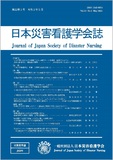Japanese
English
- 有料閲覧
- Abstract 文献概要
- 参考文献 Reference
要約
目的:福祉避難所の受入れ体制及び施設管理者の心づもりと、要配慮者の受け入れ判断に関連する要因を明らかにすることである。
方法:北陸地方で自治体から福祉避難所に指定・協定を締結されている637施設の施設管理者とケア提供責任者に無記名自記式質問紙調査を実施した。本研究では施設管理者を対象とした。
結果:受け入れ判断に関連していた要因は、福祉避難所の運営は自施設のスタッフであること(OR 5.2 95%CI: 1.4-19.2)、耐震性を認識できている以外であること(OR 8.2 95%CI: 1.3-50.3)だった。
結論:管理者は有事の際に、自施設のスタッフによる運営によって対応することを想定していること、耐震化されていないか、認識できてないことが、要配慮者の受け入れ判断を自分の役割として認識することに関連していた。
Purpose: This study investigated the factors involved in shelter managers' decisions about accepting vulnerable disaster victims.
Methods: We targeted 637 managers of facilities that had been designated as shelters for vulnerable victims following a disaster in the Hokuriku region of Japan; we also targeted the individuals responsible to care for such victims accepted by the shelters. We conducted an anonymous, self-administered questionnaire survey of the targeted individuals; the survey covered systems related to evacuation shelters for vulnerable victims and disaster preparedness. The main focus of this study was on the 109 facility managers.
Results: Factors related to the decision to accept vulnerable victims were operation of the shelter by staff at the manager's facility (odds ratio [OR], 5.2; 95% confidence interval [CI], 1.4-19.2) and others than “awareness of seismic resistance” (OR, 8.2; 95% CI, 1.3-50.3).
Conclusions: Whether facility managers considered it their role to decide on accepting vulnerable disaster victims was related to whether they assumed that their own facility staff would operate the shelter in the event of a disaster, and whether they knew if the shelters were earthquake-resistant or not.
Copyright © 2021, Japan Society of Disaster Nursing All rights reserved.


